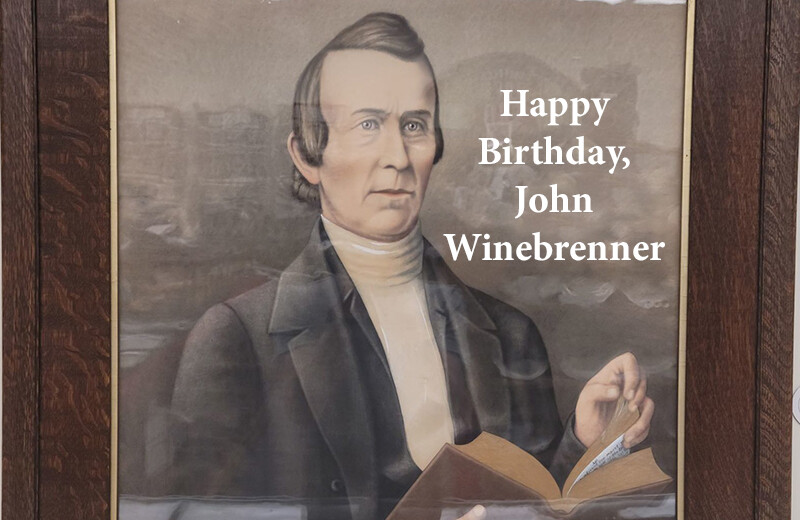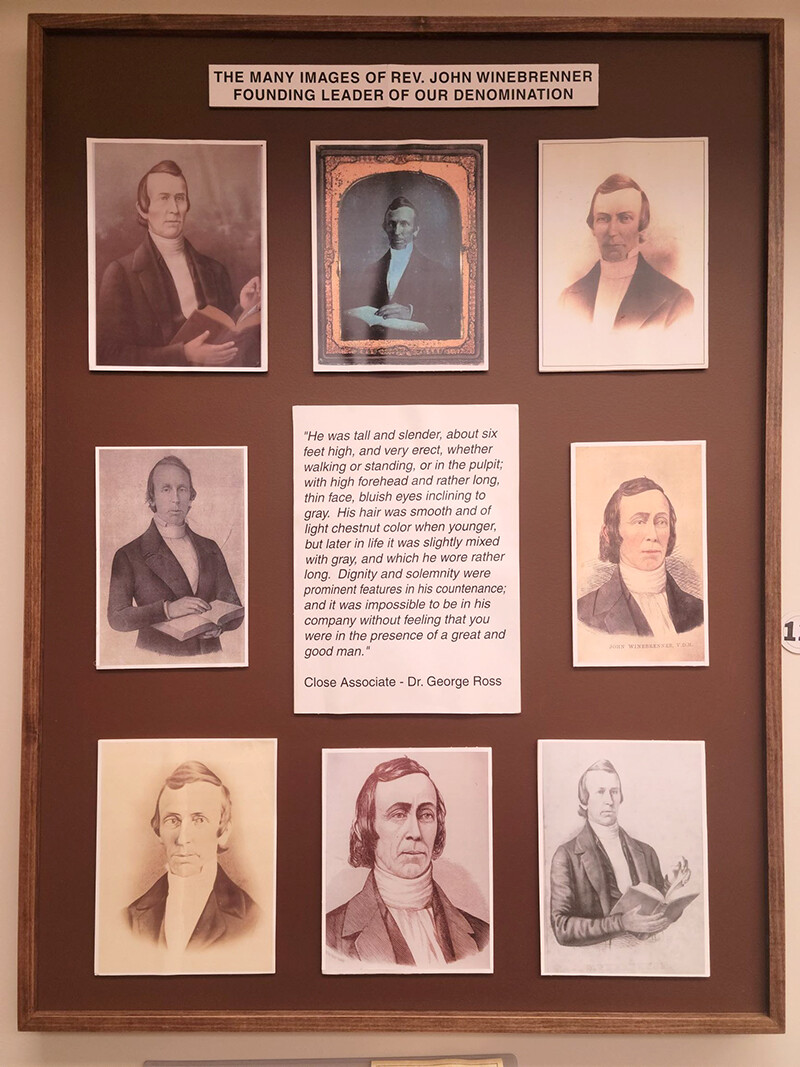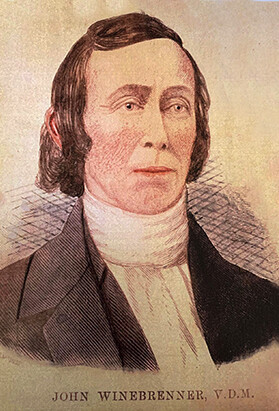
Tomorrow, Saturday, March 25th marks John Winebrenner’s 226th birthday. Born in 1797, John Winebrenner became the founder of the Churches of God, General Conference in 1825. Today we mark his birth and reflect on the person he was, recounting his conversion, the complexities of his beliefs around social issues, and his last words in death.

His conversion to Christianity is well documented, and he spoke about it in The Gospel Publisher on Feb 18th, 1842. Winebrenner said that
“I was converted, or born again, in the Spring of 1817, when deep and pungent convictions laid hold of my guilty soul. Then, like Job, ‘I abhorred myself’; like Ephraim, ‘I bemoaned myself’; with the prodigal, I said, ‘I will arise and go to my father,’ and with the publican, I cried, ‘God be merciful to me, a sinner.’ And after ‘chattering like a swallow,’ and ‘mourning as a dove’ for three or four months my poor woe-fraught soul found redemption in Immanuel’s blood, even the forgiveness of sins. It was Easter Sabbath, in the city of Philadelphia, in the presence of a large congregation of worshipers, that Jesus, the ‘Sun of Righteousness’ arose and shone upon my soul ‘with healing in his wings.’”[1]
Winebrenner’s powerful conversion experience emboldened him to strike out on a new style of worship and gathering, with prayer meetings, and tent gatherings, where people could meet Jesus in a more experiential way, without the stifling liturgies found in many protestant churches of the time. Winebrenner’s movement away from established denominations was in lock-step with the Second Great Awakening that was happening all across the United States. This revival spurred on many denominations to more seriously take up evangelism into new lands and cultivated many new denominations and church affiliations. Likewise, the revival was also a massive force for social change.
While John Winebrenner’s chief priority was the spreading of the gospel and the furtherance of the Kingdom, he also felt passionately about social reform. Winebrenner put forth the idea, both in word and deed, that such reforms were a subject worthy of the church’s attention and input, not merely a problem for the government or other public institutions to weigh in on. And, perhaps, most prominent among these reforms was the issues of slavery in the United States, or abolitionism. Winebrenner established the first Anti-Slavery Society in his area. Likewise the Churches of God passed anti-slavery resolutions, and published anti-slavery material in The Church Advocate. Richard Kern, the author of John Winebrenner’s biography, writes that “the early and mid-1840’s saw a gradual acceptance by the Church of God, as a church, of antislavery principles.”[2] Churches of God churches in the North had little trouble with this, by and large, but Churches in the South, like Texas, wanted nothing to do with the abolitionist movement, and were supremely suspicious of any Christian missionaries who were from ‘abolitionist churches’.
This began to cause a rather large problem for Winebrenner, who, as the era became more tense, saw his once extreme positions become less extreme, and potentially more “conservative”, as Kern writes. Whether this is because his views changed or because the rest of the Church moved past him, it’s not easy to tell. Some conclusions can be drawn from direct Winebrenner quotes. Writing in The Church Advocate on July 1, 1848 on the issue of church membership for slaveholders, he writes
“We are opposed to War and Slavery. Yet we believe there are Christians soldiers and Christian slave holders. Though, therefore, we go with all our might for the abolition of War and Slavery, yet we cannot feel free to unchristianize and condemn everybody who is a warrior or a slave holder.”
Let it be acknowledged that the conflation of “warrior and or a slave holder” as equally unchristian would be challenged, and downright offensive, to the majority of men and women today, whether they are apart of the Churches of God, or any Christians church, or no church at all.
Winebrenner was seemingly desperate to keep unity within the Churches of God, and yet was simultaneously, powerfully motivated to wade into difficult, country-dividing and war-starting, social movements because he sincerely believed the church should have something to say to the world. I draw attention to this particular cause and recount this part of John Winebrenner’s life not because I agree with every position he held; in fact, I personally disagree with Winebrenner’s stance on church membership for slaveholders. Indeed, John Winebrenner passed away on September 12, 1860, approximately 7 months, to the day, before the outbreak of the American Civil War. And given his views on war and slavery, it is hard to know what his exact opinion would have been but perhaps for his reputation, it is good he did not have anything further to say about that matter.
I draw attention to this cause and frame this anniversary of his life this way because I think the church still has something to say in difficult social matters. There is a strong temptation to pull back from engaging the vitriolic public discourse. That’s certainly understandable, and to be frank, the way Christians have often engaged public discourse has not always been representative of Christ, which is a problem in itself. Winebrenner’s own life is, in many ways, a testimony to the fact that doing so is hard and often hurtful. John Winebrenner lost relationships and public status for his views, and no doubt caused other people distress too.

Even as the founder of the denomination, it is entirely fair to be critical of John Winebrenner’s views while appreciating his successes and accomplishments. What I can say definitively is that John Winebrenner seemingly never lost sight of the Christian’s true calling to preach Jesus. This desire to see Jesus preached is precisely what motivated him to be so outwardly spoken about abolitionism and Christian pacifism. He is quoted, near death, as having said,
“In the event I depart, preach Jesus. Oh, the glory of preaching Jesus! I have never seen the necessity of preaching Jesus in the days of health as I have in it since I have been sick. Preach Jesus in the days of your health. Tell the brethren to stick together.”
[1] Forney, C. H. History of the Churches of God in the United States of North America. Harrisburg, PA: Publishing House of the Churches of God, 1914.
[2] Kern, Richard. John Winebrenner 19th Century Reformer. Harrisburg, PA: Central Publishing House, 1974.
CGGC eNews—Vol. 17, No. 12





Login To Leave Comment